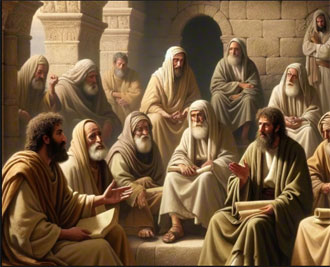
excerpts from .. ~
by Arnold Kennedy. There are conflicts within the common belief about “Jews and Gentiles”. The common teaching is that “the Jews” are Israel and the “Gentiles” are everyone else. Part of this obviously is not valid because the words transliterated as “Gentiles” in both Hebrew and Greek, are also used of Israel. We can discover that “the Jews” cannot equate to all Israel and that some “Gentiles” may be Israelites, in Scripture. Because the traditional teaching is so ingrained in commentaries, concordances, Bible dictionaries, books and in people’s minds, it is very hard for anyone brought up with the traditional belief to shake it off. Where Did “Gentile” Come From? But, unfortunately, translators have transliterated this Latin word, “Gentile”, into their versions, and it has carried forward even into recent translations. By transliterating the Latin form, it has allowed scope for the idea that it referred to Roman with all others being non-Roman, to continue. Switch the “Roman” to “Israel” (because Rome said she was Israel) and we then find how Rome expressed the two parties as “Israel” and “non-Israel”. This has continued even to this day. This doctrine has found its way into commentaries and Bible dictionaries and through these media, most Christians are still influenced. The Latin meaning of Gentiles is confusing in its own right -- it does not mean "nations." The Latin noun gen means "a nation" and is equivalent to ethnos in Greek. However, the word gentiles does not come from the noun but from the adjective, gentilis, which means "of or belonging to a nation". As all Paul’s writings are to Israelites, he uses ethnos to refer to his outcast kinsmen of Israel because that is how they were addressed in the Old Testament Scriptures -- Genesis 19:4-6; Genesis 18:18; Deuteronomy 32:41 (the “with” is not in the Hebrew text); Psalm 22:27, 28; Psalm 57:9; Psalm 67:4; Psalm 81:8; Psalm 108:3; Psalm 117:1; Isaiah 5:26; Isaiah 11:12; Isaiah 34:1; Jeremiah 1:5,10. The Latin distorts and obscures these facts and we need to check its context every time it appears in the text.
How the Word “Gentile” is Misused
We must remember that concordances give past usage rather than definitions, but within these we can see part of the true meaning like “of the same habit and tribe”. Lexicons are more definitive:
Vine goes on to show that “Gentiles” is used in Scripture of both Jews and non-Jews. How the Hebrew and Greek Words Are Translated
So, even in the KJV, “nations” is the major translation. The words may be with or without the definite article In the Greek texts the word Hellen = “Greek”, and is used thirty five times, but our translators have also chosen to translate this word (wrongly) as “gentile”, particularly in the Book of Romans. Ethnos and Hellen are quite different words! Sometimes the justification is to say that the Greeks were not Jews and therefore they must be Gentiles. This is not translating; rather it is interpreting Scripture in the versions. There is neither rhyme nor reason for all these various translations and mis-translations, other than to perpetuate a belief! That false belief is still with us today! The term “Greeks” refers to the “Greek-speaking” House of Israel members who were then in parts of the old Greek empire following their captivity in Assyria. The “Jew” refers to the Judean Israelites who returned to Judea following their captivity in Babylon. Thus, “The Jew and the Greek” refers to the same two Houses of Israel as we find in the Old Testament. The commonly accepted meaning of the word “Gentile” immediately falls flat from the translation point of view alone. When we add the fact that the word in Hebrew is used also of Israel, it falls even flatter! When we show the real meaning from the New Testament, it becomes so flat that it cannot be seen! The Hebrew and Greek words mean “nations” as races and peoples. They mean any group of a common origin, including Israel as such a group.
The Kinsman-Redeemer To Whom Did the a Paul Write? ~ Galatians 2:7: "…the gospel of the uncircumcision was committed unto me, as the gospel of the circumcision was unto Peter." ~ Romans 11:13: "For I speak unto you Gentiles, inasmuch as I am the apostle of the Gentiles." It is important to remember that the word translated as “Gentiles” in these verses is ethnos in Romans and hellen in Galatians. Ethnos refers to Israelites just as goi applied to them in the Old Testament. Everyone who has been taught that the Gentiles are always non-Israel does experience difficulty in “unlearning”. This is understandable, because this doctrine is what theology has taught; this is written into translations in a way which makes unlearning difficult. Now we can look at some other Scriptures from the New Testament that shows Israel as the only people being addressed. Please note what is highlighted in bold print. ~ Act 10:36 The Word which He sent to the sons of Israel, preaching the good news of peace through Yahshua Messiah, He is Master YAHWEH of all. ~ Act 10:43 To this One all the Prophets witness, so that through His name everyone believing into Him will receive remission of sins. ~ Act 13:23 From the seed of this man Elohim raised Yahshua the Savior for Israel as was promised. ~ Act 13:32-33 And we preach the good news to you, the promise made to the fathers, Behold Elohim has completed it to their children, to us, that He raised Yahshua. It is written in the second Psalm that "You are My Son, today I have begotten You." Here we see direct Scriptures that are particular and the exclusive. We also have a “whosoever” to which all the prophets of Israel give witness. Now, in the Old Testament books, to what “whosoever” is the Redeemer of Israel to come? Is it "whosoever of Israel" as the prophets say, or is it the "whosoever of every race" as translators think it should say? A positive decision has to be made! Someone might be thinking, “Yes, but there are still two parties“. This problem completely disappears when we take note of the historical fact that Israel separated into two Kingdoms and became known in prophecy as:
Subsequently, both Kingdoms went into captivity in Assyria and Babylon, respectively. Following the captivities, all of the 12 tribes (except for a small remnant) went North and were dispersed among the nations. These became known as the Dispersion or Uncircumcision. A small remnant of the Babylonian captivity of the Southern Kingdom returned to Palestine and formed the Judean nation. The ruling classes of the Judean nation were dominated by Edomites and their subversion of the Scriptures, the Traditions of the Elders, became the religion of the land. The Judean nation practiced circumcision and hence in the Scriptures, is referred to as the Circumcision. Consequently, the New Testament refers to two groups -- the Uncircumcision (the Israelites outside the Judean nation) and the Circumcision (the Israelites inside the Judean nation). The other uncircumcised races are not included in the uncircumcision, because the sum of the two groups addressed is “all Israel”. It is just that simple!
What is Being Said? The exclusive nature of Israel, as found through the Old Testament, continues through the New Testament. "House of Israel" - YAHWEH's chosen peoples, see : Being part of His House, Israel. The popular historic and the modern use of “Gentiles” is wrong!
|
|
ברוך אתה יי אלוהינו מלך העולם Blessed are You O YAHWEH our ELOHIM, King of the Universe |

|



